Crowded Luxury Import Market Girds for Bruising Car Campaigns
DETROIT — Two Japanese players revving up for entry into the crowded field of $20,000 to $40,000 luxury cars in the United States are on a collision course with European makers for a share of the growing upscale segment.
As a result, auto industry analysts predict some foreign competitors could get severely bruised in one of the most lucrative markets in the world.
“Neutral country attacks Germany and Japan,” says an advertising campaign recently started by Saab-Scania of America, fighting to keep the Swedish auto maker’s spot in the United States.
Peugeot Motors of America, with its roots in France, also is cranking up a new campaign and has offered dealers incentives they can pass to customers.
Britain’s Sterling Motor Cars meanwhile is restructuring its entire U.S. marketing, service and parts plan to slow a sales skid.
“What we are seeing happen is that a lot of the European manufacturers who have taken their niche for granted have realized all of a sudden that it’s not a guarantee,” said auto-industry analyst Jeannette Garretty of the Bank of America in San Francisco. “The prevailing attitude has been that there is a Saab buyer, a Mercedes buyer who will always be there.”
That’s been changing.
U.S. sales for 14 European-made cars last year were 16.4% behind 1987 levels, led by Audi’s 44.7% tumble and Sterling’s sales dip of 37.9%. During the same time, sales of all imported cars dropped 4%.
European cars made up 5.5% of the entire U.S. car market in 1988, down from 6.8% the year before.
The fiercest competition promises to be among the expensive, relatively low-volume European imports, including Saab, Peugeot, Sterling, BMW, Mercedes-Benz, Volvo and Audi. Some analysts wonder how those companies will fare in the scrap over the market pie.
“We have dealers saying this is the most competitive time they’ve ever faced,” said Tony Kirton, director of marketing for Audi of America. “They often say that, but this time I believe them.”
Besides watching each other, European makers are scrutinizing the latest wave in the Japanese invasion of the United States car market--Toyota’s Lexus and Nissan’s Infiniti luxury car divisions.
Each of the Japanese auto makers plan to begin selling two models this fall. The Lexus cars are expected to cost between $20,000 and $35,000. Infiniti’s prices will range from $25,000 to around $40,000.
That wedges them into the market now divvied up by Volvo, Saab, Peugeot, Mercedes-Benz, BMW, Sterling and Audi. The Japanese makers have said their target with Infiniti and Lexus principally is the European competition, not the few U.S. entries from General Motors’ Cadillac and Ford’s Lincoln-Mercury divisions.
“I think they will get off to a pretty good start,” said auto analyst David Healy of Drexel Burnham Lambert of New York. “The names of the companies are known. These guys have deep pockets and a lot of patience.
“I think we can count on the fact that it will be a pretty good product.”
Saab’s U.S. president, Bob Sinclair, disagrees.
“The Japanese are moving upscale, and that’s a very significant move,” he said. “They’re reliable, but they’re bland and look basically alike.”
Japan’s move into the luxury import segment, challenging the Europeans, began in March, 1986, with Honda’s Acura division. In 1988, sales for the division rose 16.5% over the year before. By volume, Acura sold more cars last year than did all European imports except Volkswagen. Division spokesman Mike Spencer said Honda is counting on Acura’s sales to increase 15% to 20% this model year.
Auto makers and analysts predict the luxury-performance segment of the car market will grow during the next year, partly reflecting the financial success of the baby-boom generation. Nonetheless, there’s still concern whether it will grow enough for everybody to survive.
“We’re really fortunate we’ve had a 3 1/2-year head start in that segment,” Spencer said.
Acura will remain strong in the market, Garretty said, because of established reputation. It’s priced lower than most of the Europeans and what’s expected for Lexus and Infiniti. Acura’s prices are more in line with Saab’s.
“They (Saab) do have reason to be concerned,” said analyst Kathleen Heaney of Nikko Securities Co. International of New York. “Saab is more of a cult following. People either love it or hate it,” she added. “Saab is one of those companies which is stuck in no man’s land.”
Healy agreed and wondered about the future of Saab and Peugeot in the United States. Peugeot has a much smaller U.S. presence than Saab--selling about two-thirds as many cars last year--but its European automobile operations are stronger, Healy said.
So, Saab has decided to take off the gloves in its advertising in an attempt to make its name better known in the United States.
“I think it’s the old story about the farmer with the mule. First you have to get its attention,” Sinclair said. “We thought we should throw bombs and hand grenades to get their attention.”






